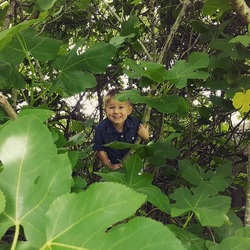 Little boys are wild and woolly little creatures. They are loud and rough, some more than others. Mine are as rowdy and rugged as they come. They love to climb and wrestle and run and rumble. And they love to be outside! Cruze is one and a half, and he's already learned to say, "I go outside". It's their happy place. We can be having a completely terrible day indoors, and when we walk into the backyard or to the park, it's like the worries wash away with the sunshine. I love seeing them out there too. I love how their little cheeks get flushed and rosy on a warm day and how their sweaty blonde hair frames their smiley faces. I love how the trademark of a good time is that puppy dog smell, dirty fingernails, and muddy shoes. Their energy, excitement, and joy are so intoxicating to watch as they climb into the tree house or sway back and forth on the swing. They play wholeheartedly with all of their strength. It's like I can actually see them getting bigger and stronger with each trek in the great outdoors. But there comes a time, one that every mother knows, that fun turns to exhaustion. That is when it is time to leave the wilderness and go indoors. Speaking of kids and wilderness, I've been reading about the Children of Israel lately in the Old Testament. You remember them from Sunday School: Moses and the Red Sea. They escaped the mean, egotistical Pharaoh and were on the way to the Promise Land, but first they had to go through the wilderness. They weren't as excited as my boys to be "outside". In fact, they were complete brats, constantly complaining and giving Moses and God grief. Although he had delivered them out of slavery in Egypt and promised them this awesome land that flowed with milk and honey, they couldn't see past the end of their noses. They had no vision. Stupid kids. It reminds me of the novel, Lord of the Flies, that I taught last year. This story is about a group of school-aged boys from a private school in England that were put on a plane to evacuate the country during WW2. Their plane crashes over the ocean, and the boys find themselves stranded on an island without adult supervision. The boys eagerly select a leader, and jobs are delegated to ensure their survival and enable their rescue. Only a few of the boys are REALLY trying to get off of the island, while the rest of them become obsessed with unnecessary things like hunting (even though there are plenty of berries to sustain them). As their time on the island lengthens, their humanity decreases. They lose their ability to reason, becoming very savage and ruthless. Both groups, the Israelites and the boys, behaved badly in the wilderness. They lost track of their purpose. And there is a purpose for wilderness. I'm not very outdoorsy. Shocker, huh? So, when I found myself in my "wilderness", it was kind of a culture shock. With the restrictions of my past gone, my first reaction was a sense of total freedom: no one could tell me what to do here. I could run wild and do whatever I wanted. It was liberating...for a while. It didn't take long for the wide open spaces to start closing in on me, and the fresh air that seemed to fill my lungs with life began to choke the air right out of me. Then the longing set in. Sometimes I longed for the past, all the while knowing I couldn't go back and, deep down, not really wanting to. The future was no longer perceivable. I couldn't navigate this jungle that I found myself in, so I just felt stuck. I spent years here, and my surroundings became familiar. The emptiness became normal. Then, something happened that jolted me into awareness, consciousness. In this state, the question can be raised: what is the intended purpose for wilderness? Wilderness: the place between where you've been and where you're going. It's the area between salvation and promise. It's a training ground. It's a place to iron out the kinks. It's a place to bury dead things and to birth new things. It's a waiting room. It's a growing place. The Bible says that the Lord led the Children in the wilderness for 40 years to: 1. humble them 2. test them 3. see what was in their hearts Humble. From what I can tell, God likes this characteristic...A LOT! He is not a fan of arrogance and pride. Moses was described as the most humble man on the face of the earth, and he was pretty tight with God, so I think there is a correlation here. The vastness of the wilderness can make you feel small. At some point you need to realize that you can't weather it alone. This doesn't mean you quit trying. It means you quit trying to do it alone. You humble yourself by recognizing your inadequacies and start relying on something bigger than yourself. Test. When I give my students a hard test, they always ask me why I hate them. Each time, I explain that because I love them, I want them to master the concept. That is the essential purpose of a test: the mastery. Comparatively, we often feel victimized when we are tested, like it is a personal attack. But maybe, just maybe, it is to drive out a weakness in us and help us conquer something that may currently be controlling us. Remember that Jesus himself went into the wilderness for 40 days and was tested in every way imaginable. In the wilderness, Jesus defeated the devil. When my kids fail the aforementioned hard test, we reteach and retest. How many times have we failed a test we were given? I have. Many times. So, you learn from the failure, and you better believe that a retest is on its way. To see what is in the heart. Nothing will bring out what you're made of like the wilderness. When you are in survival mode, when there is pressure and testing, when you're somewhere you really don't want to be, and there is no one else around is when your true self will emerge. What are your instincts? To doubt, to complain, to distract yourself? If you're like me: yes, yes, and yes. It goes against our nature to respond gracefully in faith, but it can be done...with help. We must have help. We mustn't stay there too long. Spend too long in the wilderness, and things will start to go south. With the Israelites, we see a forgotten gratefulness sour into reckless abandonment. With the boys, we see basic human kindness convert to sheer savagery. Spend too long in the wilderness, and you will end up like Tom Hanks in Castaway, a little crazy, talking to a volleyball named Wilson. Spend too long in the wilderness and you may end up like Chris McCandless, a wilderness aficionado that made the fatal mistake of eating the wrong seeds that contributed to his starvation in Into the Wild (based on a true story). What the wilderness is not: it's not a place to die. It's not the destination or a place to make a home. It's the means, not the ends. Everyone spends time in the wilderness, some just stay longer than others. Just remember why you're there and WHO is with you, even when you can't see or feel him. And don't get so distracted that you stop looking for rescue vessel. We have a promise and a purpose, and that doesn't include dying in the wilderness! SOS! A. Deuteronomy 8:2 Remember how the Lord your God led you all the way in the wilderness these forty years, to humble and test you in order to know what was in your heart, whether or not you would keep his commands.
0 Comments
|
AuthorHey! My name is Andrea. I'm a teacher by day in a small Texas town, but in every other aspect of my life, I consider myself a learner. This blog is about life: learning through experiences, sharing through stories, and growing through faith. Archives
March 2018
Categories
All
|


